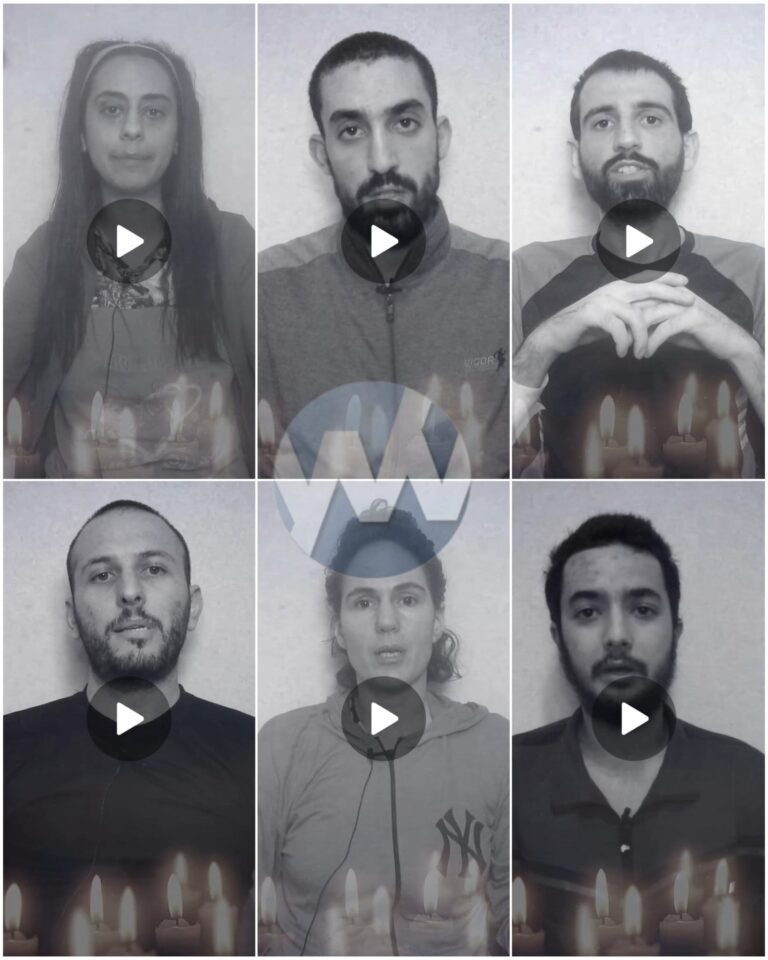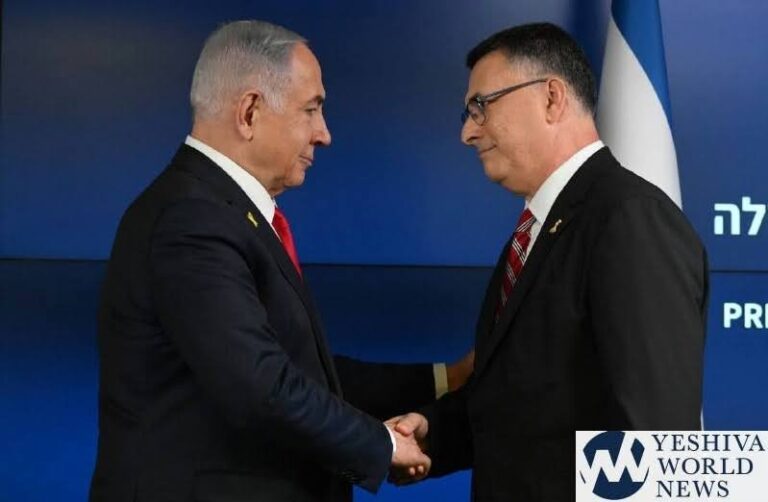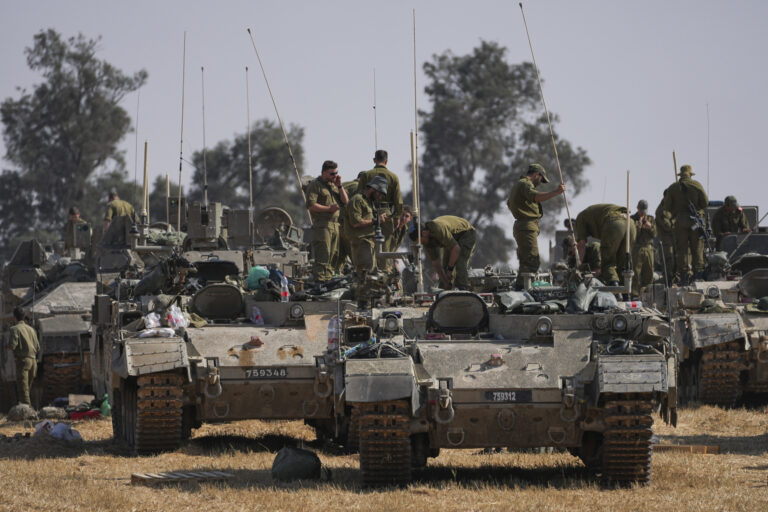By Rabbi Yair Hoffman
Their names and holy souls pull at the heart-strings of any feeling Jew. Many of them exemplified remarkable heroism and sacrifice. They went back to save friends and protect others. We all davened and said Tehillim for them for the past eleven months. And now, sadly, 6 of the 250 kidnapped neshamos have been brutally and depravedly murdered – two point four percent.
- Ori Danino H’y’d,
- Carmel Gat H’y’d,
- Hersh Goldberg-Polin H’y’d,
- Alex Lubanov H’y’d,
- Almog Sarusi H’y’d.
- Eden Yerushalmi H’y’d,
The Rambam in his Yesodei HaTorah of his Mishne Torah writes about them. These six precious souls were murdered solely because they were Jewish and the Rambam writes in Yesodei HaTorah (5:4), “There is no virtue above their virtue.”
The Rambam applies to those who are murdered solely because they are Jewish – two verses in Tehillim (44:23), “It is for Your sake that we are killed all the time, that we are considered as sheep for the slaughter; and Tehillim (50:5), “Gather to Me My devoted ones, who made a covenant with Me over a sacrifice.”
Let’s focus on two aspects of this Rambam for a moment. They are called, “Harugei Malchus” and they are also called, “My devoted ones.” But the Rambam lists among them Chananya, Mishael and Azaryah – and they did not die! They were ultimately saved! How could the Rambam refer to them as Harugei?
That’s one question. But let’s also ask a second question – a question that applies to our current situation. Almost every day we cry. We read in the news of remarkable soldiers who were taken in the prime of their lives. The second question is: How do we get out of this?? How can we try to ensure that Jewish blood is not spilled?
The resolution to the first question is that Chananya, Mishael, and Azaryah were willing to die. The obvious extension is that every fighting soldier involved in the three conflicts currently facing Israel is included in this category as well.
THE SHLA HAKADOSH
Which brings us to the answer for our second question. But first a remarkable Shla HaKadosh (found in Shaar HaOsios Brios). The Shla notes that there are 620 letters in the aseres hadibros – the 10 commandments. The last 7 of these letters form the two words – asher l’rayacha – a term intimately associated with the Mitzvah of V’ahavta l’raya kamocha – loving our neighbor as ourselves.
INCREASE AHAVAS YISROEL
So, in order to get out of this we must all markedly increase our observance and appreciation of this Mitzvah of Ahavas Yisroel. And we must daven, pray, search for every means at our disposal to help our brethren out. At every opportunity we should be melamed zchus on Klal Yisroel and not like those who assume the worst. We should always practice the notion of “Resha versus Rasha.: Always remember the following dictum: “Hate the Resha but love the Rasha. Hate the notion of evil, but love the Rasha.” This refers to acheinu bnei Yisroel. The pasuk in Vayikra (19:17-18) tells us not to hate your brother in your heart but practice v’ahavta laracha kamocha.
TO THE POINT WHERE WE BECOME SICK
The Gemorah in Brachos (32a) says that our care and concern for others must be to the point that in our ahavas Yisroel when we hear of their difficulty – that we become sick over it, citing a drasha of a pasuk – vayichal Moshe – meaning .
In the Gemorah in Yuma 75a, it states, “If one has anxieties – he should relate them to someone else.” The Sefer entitled, “Igra d’Pirka” gives an interesting explanation to this. He asks what is the reason for this Gemorah? He answers that it will help enable a cure. How so? He can say, “Look Hashem, I understand why I have received this punishment or travail. But why should my friend also suffer stress on account of this?” With this valid claim, one can shift or change a Divine Decree.
Sharing the burden thus helps his or her own situation.
I would like to add another two thoughts. The first is that the Gemorah (Bava Kamma 92a) tells us that whosoever prays for his friend, he is answered first. The causing of your friend to pray for you will cause his or her own prayers to be answered first. Having this in mind is a manifestation of Ahavas Yisroel as well.
The second thought is that the TaZ tells us that whenever one prays for another person he should always add the words that Hashem should provide that person with greetings of a refuah shleimah among the other cholim of klal Yisroel. He writes that this, in fact, effects a quicker and better cure.
All this shows the incredible power of Ahavs Yisroel. It is something that could help us get out of the mud.
The author can be reached at [email protected]












3 Responses
The Radical Islamic World is trying to destroy judaism from its foundations. Hamas and their Proxy’s such as Iran Qatar and Yemen, are putting maximum pressure. It’s not about lands, it’s about their “Islamophobia” and the danger they pause to the existence of this world. For hundreds of years they were not able to get their wishes, and even in their own countries, there are major disputes as to how the practice of Islam should be taught the suni and shiats are fighting against one another.
One thing is for sure every day those captives are in Gaza, as much as it painful seeing our Women getting humiliating by dirty animals that are practising Islam just simply they wrong way… works for the Israeli IDF cleaning up Hamas. And surly they are doing a pretty good job
The author wrote:
“…They are called, “Harugei Malchus” and…“My devoted ones.” But the Rambam lists among them Chananya, Mishael and Azaryah – and they did not die!…How could the Rambam refer to them as Harugei?
The resolution…is that Chananya, Mishael, and Azaryah were willing to die. The obvious extension is that every fighting soldier involved in the three conflicts currently facing Israel is included in this category as well.”
Huh? Does Zionism or anything else create additional rules with which the Torah is expounded? There could be any number of reasons that the Rambam in this context included Chananya, Mishael, and Azaryah among those who were considered “harugei malchus”.
The simplest reason is not that they were *willing* to die, as the author asserts, but rather that they were actually put to death – they were thrown into a fiery furnace!! Hashem miraculously saved them, of course; but they were still put to death by the king, as in “harugee malchus”.
So, there is no proof whatsoever from the Rambam that the author’s Zionistic assertion of “willing to die” as the reason for the Rambam including those three tzaddikim, and there is certainly therefore no proof to his Zionistic “obvious extension” either.
Since the Zionist IDF is a place of shmad and the gimmel chamuros, and that very same Rambam in the prior paragraphs discusses how any one of those is yehareig viAl yaavor, it is sadly ironic (but totally in keeping with Zionism) that the author omits all of that.
A Jew’s status after 120 is essentially determined by his Torah and mitzvos. The only time a Zionist soldier’s “status” changes in the manner mentioned here by the Rambam – like being called “My devoted ones” and considered to have died al kiddush Hashem – is if he were to die (or at the very least be actually put to death R”L L”A) specifically because he was a Jew (including if that happened while the Jew happened to have been in the Zionist IDF).
With all due respect (to Rabbi Hoffman and to all the murdered hostages and soldiers) the Rambam does not say anywhere he is talking about people killed solely because they were Jews. He is talking about someone who had the option to either do one of the 3 cardinal sins or else die and the person chose to die. (I would love sources which say that someone who dies while being mechalel shabbos/ clubbing at nova etc would be called dying al kiddush hashem. Surely this more likely falls under the category later mentioned in the rambam “הרי זה מחלל את השם” )
Secondly soldiers going to fight definitely do not fall under the category of being killed solely because they are Jews. They are being killed r”l because they are enemy forces for the terrorist animals of Hamas. Anyone trying to fight them would be killed not because they are Jewish but because they pose a threat. (Similar to the IDF killing terrorists, obviously not because they are Muslim but because they are posing a danger to israelis/idf.)